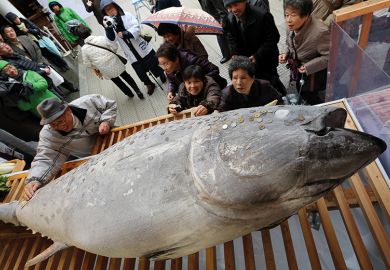Japan’s top private university is a strong candidate for the country’s multibillion-yen excellence initiative, thanks to its early progress on transparent hiring and emphasis on internationalisation, according to its head.
Aiji Tanaka, the president of Waseda University – one of the country’s most prestigious institutions – was confident that, while it may lack some of the advantages of its competitors, Waseda can be successful in its bid for the ¥10 trillion (£55 billion) scheme.
The fund, which the government plans to grow through investments, will ultimately be distributed among two or three institutions, with winners expected to divvy up ¥280 billion in annual profits starting in 2024. Other leading contenders for the money include Tokyo, Kyoto and Tohoku universities – public institutions with research hospitals and Nobel prizewinning scientists on their faculty.
Speaking to Times Higher Education, Professor Tanaka conceded that in these respects, Waseda posed “no competition”. But he believed that behind-the-scenes work by his institution has given it other key advantages – potentially enough to clinch the sought-after funding.
In the past few years, Waseda has introduced merit-based, transparent recruiting practices, helping it become the “most global university in Japan”, having hosted 8,500 internationals in 2019 before the pandemic, according to Professor Tanaka.
By his own admission, the achievement was hard won. It took years to move the institution away from the highly opaque referral and appointment process, done behind closed doors and through connections, which used to be the norm at Japanese universities, said Professor Tanaka.
“Some big professors [would] say: ‘I’ll recommend this person, why don’t you take them,’ and then there’s no other competition…I abolished that,” he said.
The change required a shift in mentality. Professor Tanaka admitted that he made numerous failed attempts in his time as dean of academic affairs in 2006-10, and as vice-provost in 2010-14.
“Most of the time my ideas were rejected,” he said. “During the first four years [as dean], I was advocating that we have to change the style of faculty recruitment so that job announcements would be international, and that we should introduce a tenure-track system for faculty recruitment, but those ideas were not paid serious attention at all.”
He was also adamant that Waseda explicitly include language in its job advertisements outlining its commitment to non-discriminatory hiring. Ultimately, a push from Japan’s government to promote international collaboration helped him convince its reluctant board members.
“My proposal was opposed twice by most of the board of trustees, but it was accepted by a majority of the members when we found that every single leading university in the US required the clause of gender equality and diversity and inclusion in job announcements,” he said.
Following on this pledge, he pushed through a change – not uncontroversial – to favour female job candidates in cases where they seemed equally qualified for a position as male applicants.
Other changes have also come through. In 2021, Waseda introduced a tenure-track system in all its schools. Last year, it put in place a policy to provide living expenses for partners of faculty – regardless of gender – who ask to be stationed at campuses outside its Tokyo flagship, making it among few universities to do so.
Other areas, though, remain an ongoing battle. For instance, Professor Tanaka met pushback when he advocated for Waseda’s schools to incorporate courses taught in English.
“It might not make much sense to offer certain subjects, such as the Japanese language or Japanese law…in English,” he said, although he noted that international law, which requires use of English, is an exception. “In all other academic fields we should be able to teach some courses in English.”
From a logistical standpoint too, Professor Tanaka believed Waseda has a leg up on its competitors. Universities participating in the fund are expected to generate at least 3 per cent annual increase in the value of their research activities over five years. While some academics have worried that many institutions have little experience in being financially self-reliant, Waseda already has this, as the first and only university in Japan with an operating endowment fund that has supplied, on average, 10 per cent of its annual income over the past five years.
“If the government designates us as one of the universities for international research excellence, we can operate it without problem when other universities are trying to learn how to do it,” he said.
Professor Tanaka was also confident that Waseda could draw more research funding from industry, noting its strong alumni network, which includes incoming heads of Toyota, Sony, Panasonic and Mitsubishi, among others.
He is keen to engage these companies, especially in carbon research, an area he declared a priority for the university two years ago.
“Many of them are talking to us, saying, ‘Why don’t we have collaborations?’” he said.
POSTSCRIPT:
Print headline: Private university eyes Japanese funding jackpot
Register to continue
Why register?
- Registration is free and only takes a moment
- Once registered, you can read 3 articles a month
- Sign up for our newsletter
Subscribe
Or subscribe for unlimited access to:
- Unlimited access to news, views, insights & reviews
- Digital editions
- Digital access to THE’s university and college rankings analysis
Already registered or a current subscriber?








